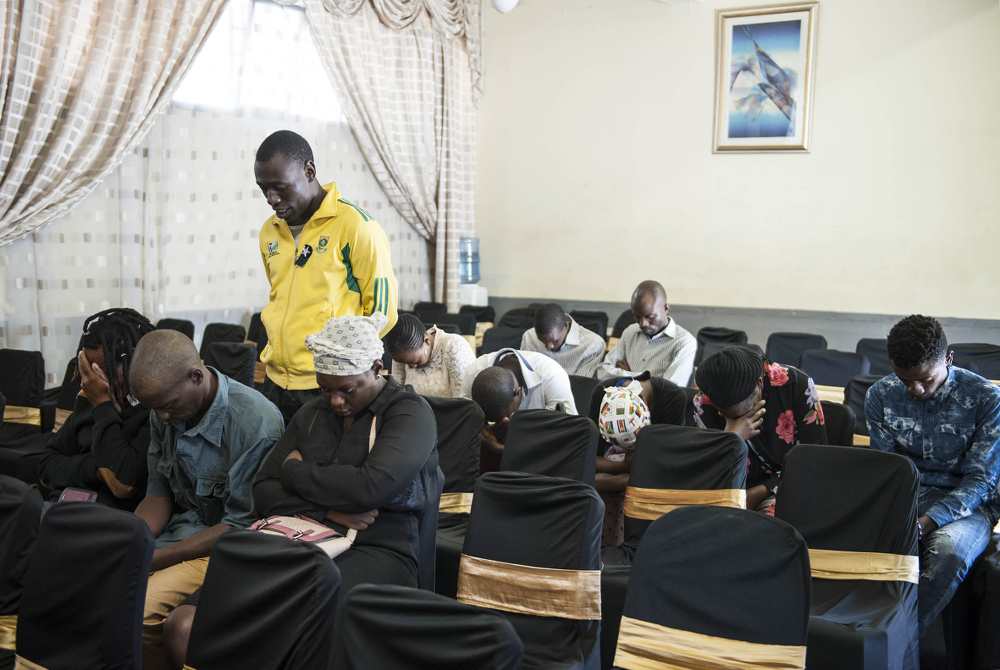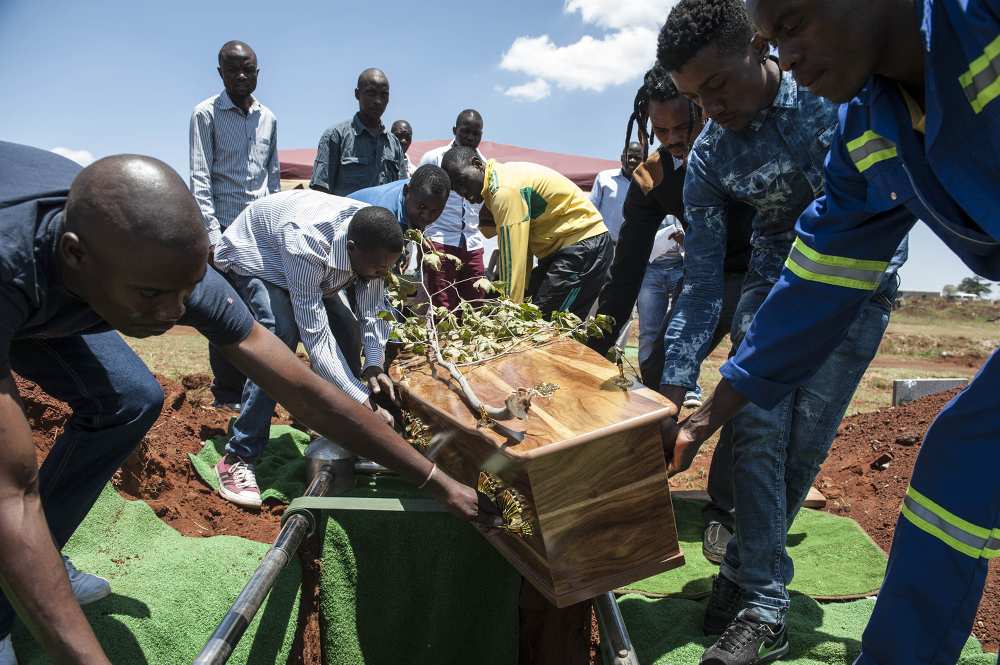Distress: Aaron White couldn’t dress the decomposing body of his brother Taruai in new clothes.
It took Aaron White three months working as a welder in Pretoria to scrape together the R6 900 needed to bury his brother, Taruai. With the end finally in sight, there is one more unexpected hurdle to overcome.
“They said I must get clothes for him. Because he is not dressed, I have to go buy him clothing, first,” he says.
The youngest of the White brothers is still in Zimbabwe; there is just not enough money for him to attend the funeral. Their only surviving uncle lives in South Africa with his wife, and has been supporting Aaron throughout the agonising process of giving Taruai a proper funeral.
The two hustle into the back of the funeral parlour with a black plastic bag of brand-new clothes. The funeral service is already an hour behind schedule, and Saturday is a busy day for funerals.
A distraught Aaron returns, tearful, his thick dreadlocks and hands covering his face. “We can’t put his clothes on. His body is all wrong; we can’t dress him.”

Empty chairs underline the loneliness of a foreigner’s funeral. Photos: Paul Botes
The problem is not an unusual one at a parlour that offers burial services to foreigners from Southern Africa and as far north as Nigeria. “This body has been here too long. Sometimes the fridges can’t stop the body from rotting,” says a mortician, after overhearing the conversation.
The idea of clothes is abandoned, and Aaron asks his uncle to find the money for a blanket to cover the mouldering body.
In the hall provided by the parlour on its premises, the pastor does his best to cover the mostly empty black plastic chairs with song and words of comfort, but his attempts only serve to emphasise that many of those in the room did not know Taruai well.
Not that his brother really notices. Aaron is still haunted by the sight of his brother’s body and the many indignities heaped on it even as he keeps up his seemingly never-ending attempts to make the funeral seem normal and dignified. The nightmare is finally drawing to a close.
In the Slovoville Cemetery in Soweto, as the few men in attendance take turns shovelling soil into the grave and a three-member choir repeats the same song over and over again, Aaron gives voice to the sentiment shared by so many in his position. He wishes, he says, that Taruai had never come to South Africa, that he had just stayed in Zimbabwe. “At least I could have buried him there.”
Taruai was found dead in his room in Jeppestown, Johannesburg, in lodgings he shared with some of his fellow security guards. It is not clear how the previously healthy 20-year-old died. His friends would later speak of him sleeping with an “unclean” girl and growing ill soon after, but in the absence of an autopsy there are only suspicions and superstitions.

Taruai’s body was buried in Soweto.
Aaron, who was on his way back to Zimbabwe, was in Polokwane when he got the call at about 11pm. He spent hours on the pavement of a petrol station, waiting to get a lift back to Johannesburg. By the time he got there the following day, Taruai’s body had already been taken to the funeral parlour and the odds were already stacked against the dignified funeral Aaron so desperately wanted.
“They told me that I have to get an affidavit from the police in Zimbabwe to prove that Taruai is Zimbabwean, and go to the chief to confirm that he was from our village,” a despondent Aaron says.
Taruai had no documentation to prove his Zimbabwean citizenship, never mind his legal status in South Africa. That precluded any help from the Zimbabwean consulate, which requires a passport, ID or birth certificate, plus an affidavit from a family member, before it will provide clearance for the repatriation of a body.
With both their parents dead, Aaron had no prospect of getting the paperwork sorted out and so started the process of trying to bury Taurai in the country where he had sought a better life.
“With some things you just don’t have a choice, you just don’t have a choice,” he says.
Tenson* was 85 when he died at the end of August. The Malawian’s body is still waiting to be claimed.
“He was just a person I knew, from around here. He was close to my family – that’s how I know him, nothing else,” says Joyce*, an elderly woman says in Sesotho, reluctantly.
Others in their Yeoville community say the situation is much more complicated than that. Joyce was Tenson’s lover for many years, they claim, which is why he called her to tell her he had been admitted to hospital. But now she refuses to take on the financial burden of burying him in South Africa. And his wife and children in Malawi won’t pay to have his body repatriated.
“Ntate Tenson always used to say he had three children back at home, that he was providing for them back at home,” Joyce explains, from what she supposedly knows as an acquaintance. “I’m surprised that they don’t want anything to do with him, or even help with burying him. It means he wasn’t sending anything to them … I don’t know.”
In an earlier conversation with the morgue, it appeared things had soured between the two parties, to the point where Tenson’s children in Malawi would no longer answer telephone calls. Apparently, the children and their mother had done their best to convince him not to return to South Africa because of his old age and frail health, but he had insisted.
He needed work, he said, and would find it in Johannesburg, as he had in previous years. The family believed he wanted to return to his lover, whom they also suspected to be fleecing him.
The impasse leaves Tenson’s body stacked with many others, neither released for a pauper’s burial nor with much prospect of a formal service either.
* Names have been changed
It’s the young who die in SA
It is not clear how many for-eigners die and are buried in South Africa, but anecdotal
evidence suggests the number is rising sharply among the biggest segment of the immigrant population.
Batiraishe Mukonoweshuro, consul general for Zimbabwe in South Africa, says his office used to repatriate about 150 bodies a month.
In 2015 the office recorded about 3?000 deaths, not counting bodies repatriated by Zimbabwean representatives in Cape Town, or Zimbabweans buried in South Africa without the knowledge of the consulate.
The highest number of bodies repatriated last year, 327, was in July. The average age of the dead is between 25 and 35 because, officials believe, younger people are more likely to come looking for a better future and then find themselves in living conditions conducive to disease.
Road accidents take their toll, but communicable diseases such as tuberculosis and pneumonia are common causes of death for young Zimbabweans.